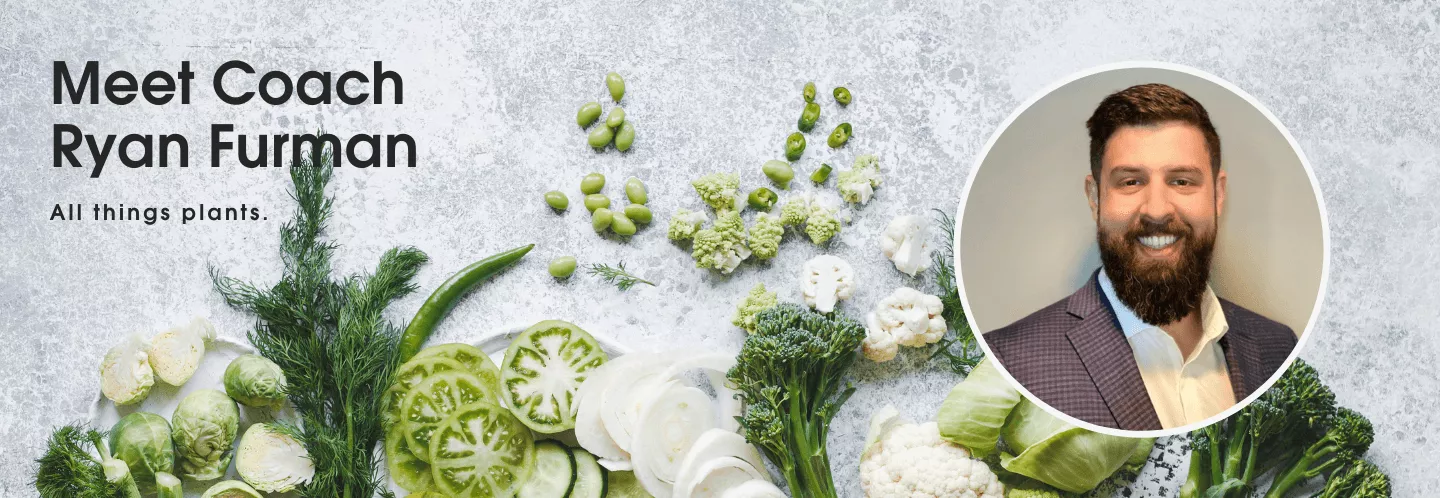October 29, 2020
Coach Ryan Furman is the King of Plant-Based Eating

Plant-based TaskHuman coach, Ryan Furman, recently sat down with fellow coach Jamie Carroll during the TaskHuman video podcast: “TaskHuman Talks.”
It comes as no surprise that the discussion centered around his plant-based lifestyle, but it was more than just recipe-swapping (although, he shared a delicious one!).
As a weightlifter and avid gym-goer, Coach Ryan initially turned to a plant-based diet when his own health began to decline. He was 27 years old and taking a nap everyday – something he knew he shouldn’t need daily.
In his 9 years of embracing a plant-based diet, Coach Ryan has learned a lot about what going plant-based can do for you.
Here are his core beliefs:
1. There is an animal protein fallacy, especially for weightlifters.
2. Having a varied diet still matters.
3. Change takes time.
4. Taste isn’t sacrificed for health on a plant-based diet.
Coaches Ryan and Jamie covered a lot of ground in the interview. Here are some of the main topics they discussed:
1. What is the Difference Between Plant-based and Vegan?
For him, Coach Ryan says there is no difference, but he notes that many people in the vegan community feel strongly otherwise. Essentially, the difference comes down to reasons for the diet, he says.
Vegans do it for animal welfare. Plant-based dieters do it for health reasons. He adds that many plant-based dieters also embrace vegan ideals, it just isn’t their main reason for starting the journey.
Coach Ryan stressed that as a plant-based weight-lifter, he feels better than he did when he was consuming animal protein. He follows his gym session with a huge, dense salad.
“Not only do I feel satisfied, I don’t feel like garbage,” he says.
2. What are the benefits of a plant-based diet?
Coach Ryan believes plant-based diets deliver amazing and varied health benefits. One major perk is that they support stronger mental health.
“Studies show,” Coach Ryan says, “that eating plant-based doesn’t inhibit dopamine receptors.” But eating animal protein does.
He also insists that health doesn’t only mean dieting. He encourages connecting with friends, practicing meditation, and upping your gut-health game.
“Gut health is my passion,” he says.
Going plant-based can also alleviate inflammation, reduce cholesterol and blood pressure, and clear sinuses. Plus, many people feel an abundance of sustained energy throughout the day. Feeling better goes a long way to helping you appreciate the diet change.
Many people worry that a plant-based diet means their food will be tasteless. Coach Ryan assures it is just not the case.
“Anything that anyone has eaten in the history of man, there’s a vegan version that tastes good,” he says.
3. Are there people with certain conditions that need meat?
Coach Ryan’s short answer? No.
There is nothing you need from meat that you can’t find in plant sources. Many times, the plant sources are more bioavailable and easier to digest. Even eating organic, grass-fed meat means you’re consuming the animal’s own hormones and cholesterol.
In his opinion, humans aren’t evolved to eat and digest large amounts of animal protein.
“We don’t have huge canines. We have long digestive tracts, like herbivores. Carnivores have huge canines and short digestive tracts,” he says. Those shorter tracts allow carnivores to digest and expel meat waste from their bodies before it harms them. Humans can’t do that.
4. Is transitioning to plant-based hard?
It usually is difficult for people, Coach Ryan says. He admits it was hard for him. It’s not only the taste, it’s the habit.
To make such a large change, you need to change the neural pathways in your brain, which can take several months. But while you will crave meat and dairy at first, your body will detox and lose the taste for those foods, and you’ll begin to crave vegetables and vegan proteins.
For some, going “cold turkey” is too much. Coach Ryan explains that it’s fine to go slowly. He suggests starting with one meal a week that is vegan. Then increasing it to two. Then four. And so on. As your body becomes more used to the food, incorporating more vegan meals into your week will be easier.
Coach Ryan emphasizes that he works with many types of clients on TaskHuman, not just plant-based dieters. He also serves as a personal trainer, but because he believes what you eat manifests itself in your body (“You are what you eat”), he won’t work with just anyone as a trainer.
“There’s no one I won’t work with, unless they’re not willing to change their diet,” he says.
5. How healthy is a plant-based diet, really?
Coach Ryan is quick to admit that just because someone is eating plant-based doesn’t mean they’re eating healthy. That is the largest difference between just plant-based diets and whole food plant-based diets.
“If you can’t pronounce what is in food, it’s probably not healthy,” Coach Ryan says. Most of your foods should be healthy, including having good-sized salads at every meal.
But he also cautions against having an overly strict and limiting diet. Coach Ryan suggests following the Rule of 80s: 80% of what you eat should be whole, plant-based food. The rest is up to you.
“Everything in moderation, including moderation,” he says.
Some people think that restricting or eliminating animal products means you need to take lots of supplements in order to stay healthy. It’s not true, Coach Ryan says. As long as you’re eating a varied diet as a vegan, the only supplement you need is B12.
And now the recipe! At the end of the interview, Coach Ryan shares his for loaded fries: complete with “bacon” and homemade melted “cheddar cheese!”
If you want to hear the whole conversation, listen here.
If you want to explore more plant-based options or have more questions for Coach Ryan, reach out to him on TaskHuman for a 1:1 LIVE video call.
